人教版英语初中九年级上册知识讲解,巩固练习(教学资料,补习资料):Unit 4 I used to be afraid of the dark 第1课时Section A(含答案)
文档属性
| 名称 | 人教版英语初中九年级上册知识讲解,巩固练习(教学资料,补习资料):Unit 4 I used to be afraid of the dark 第1课时Section A(含答案) |
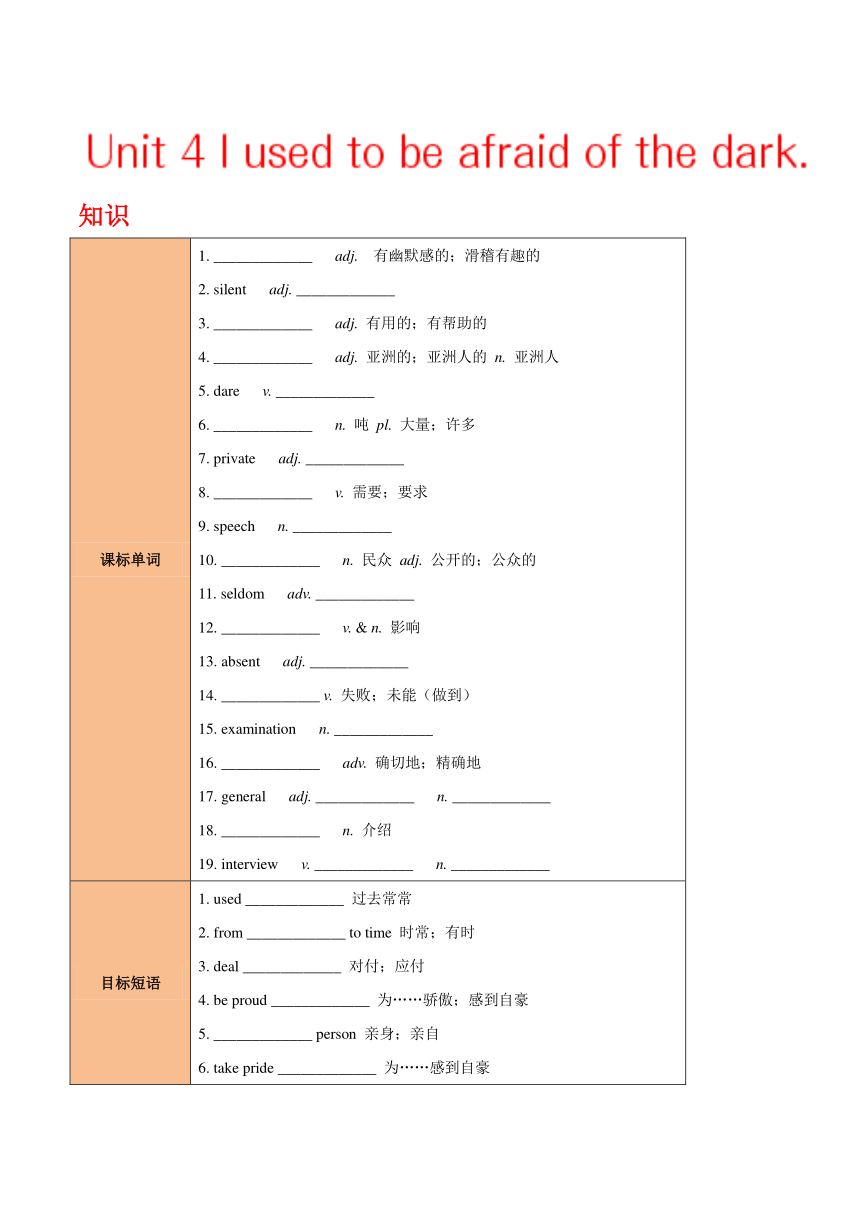
|
|
| 格式 | zip | ||
| 文件大小 | 765.5KB | ||
| 资源类型 | 教案 | ||
| 版本资源 | 人教新目标(Go for it)版 | ||
| 科目 | 英语 | ||
| 更新时间 | 2019-09-15 00:00:00 | ||
图片预览

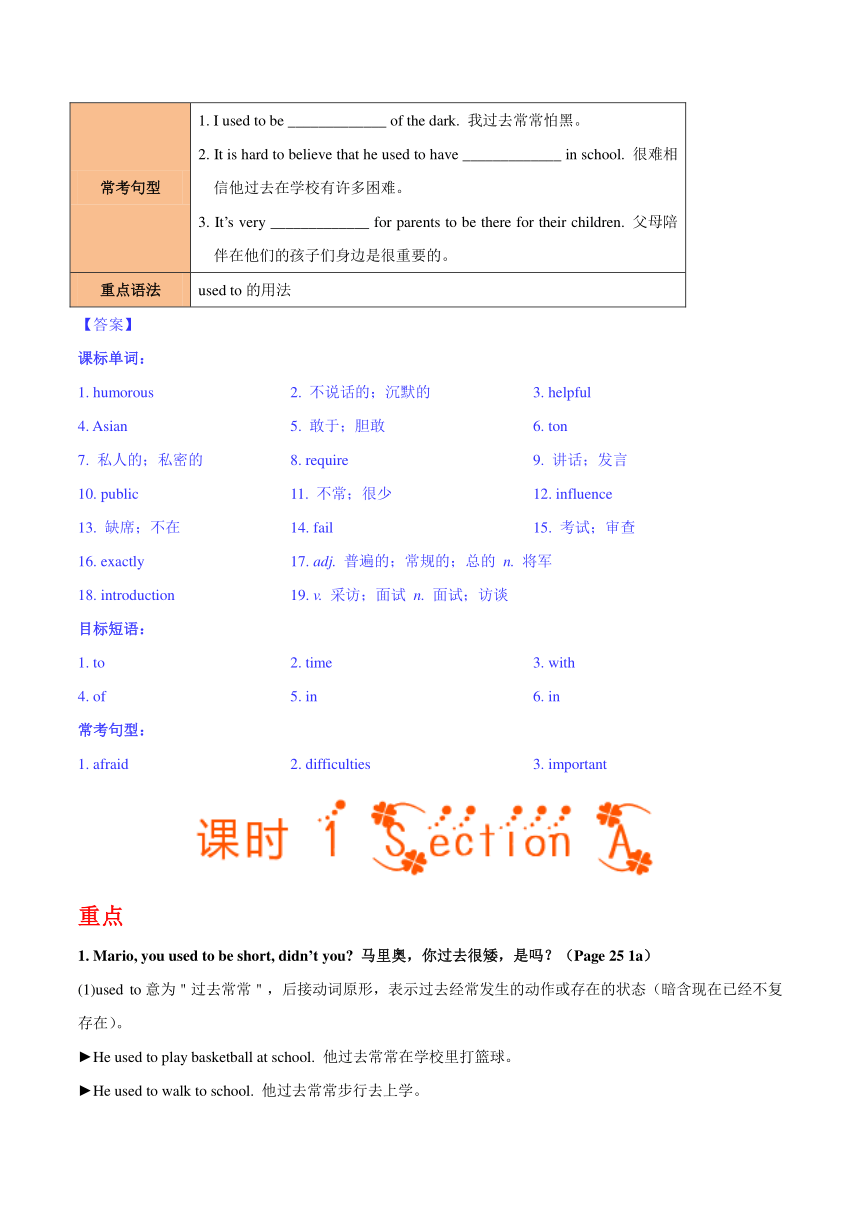
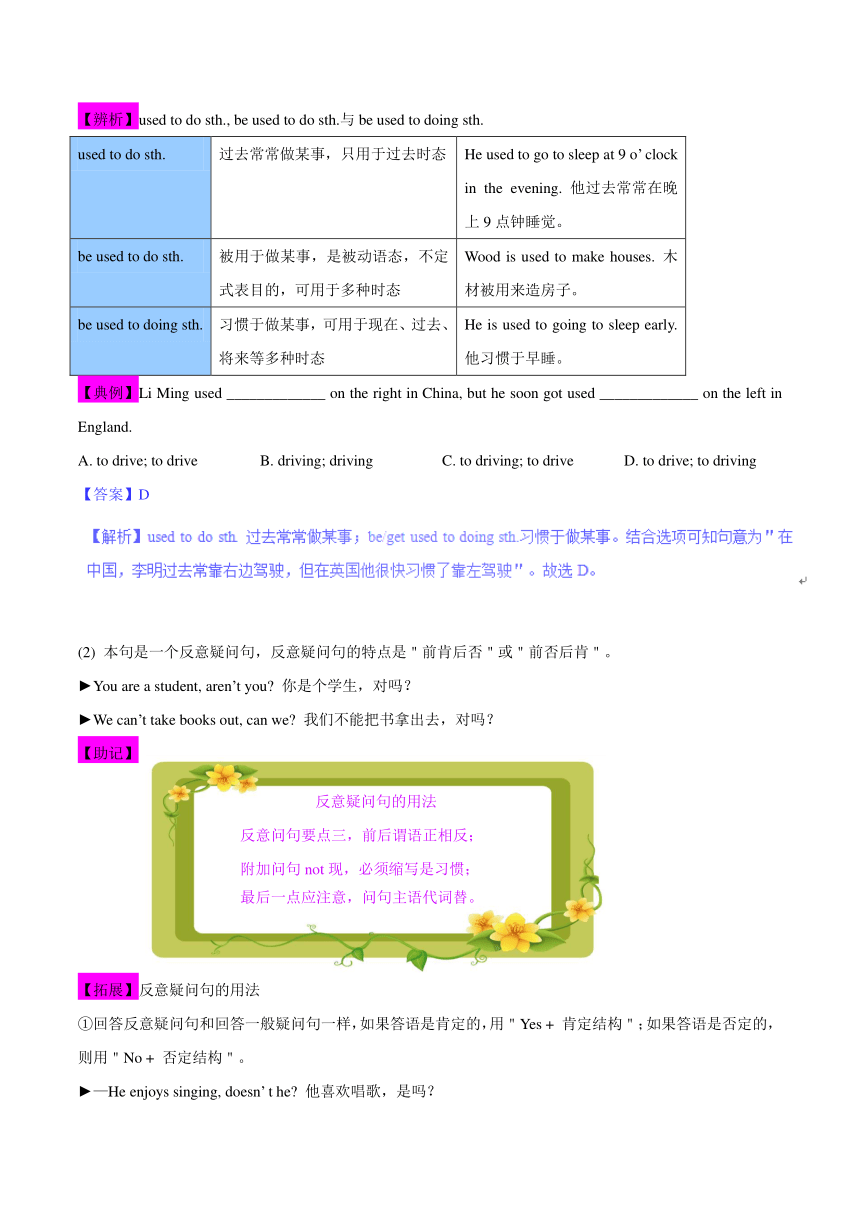
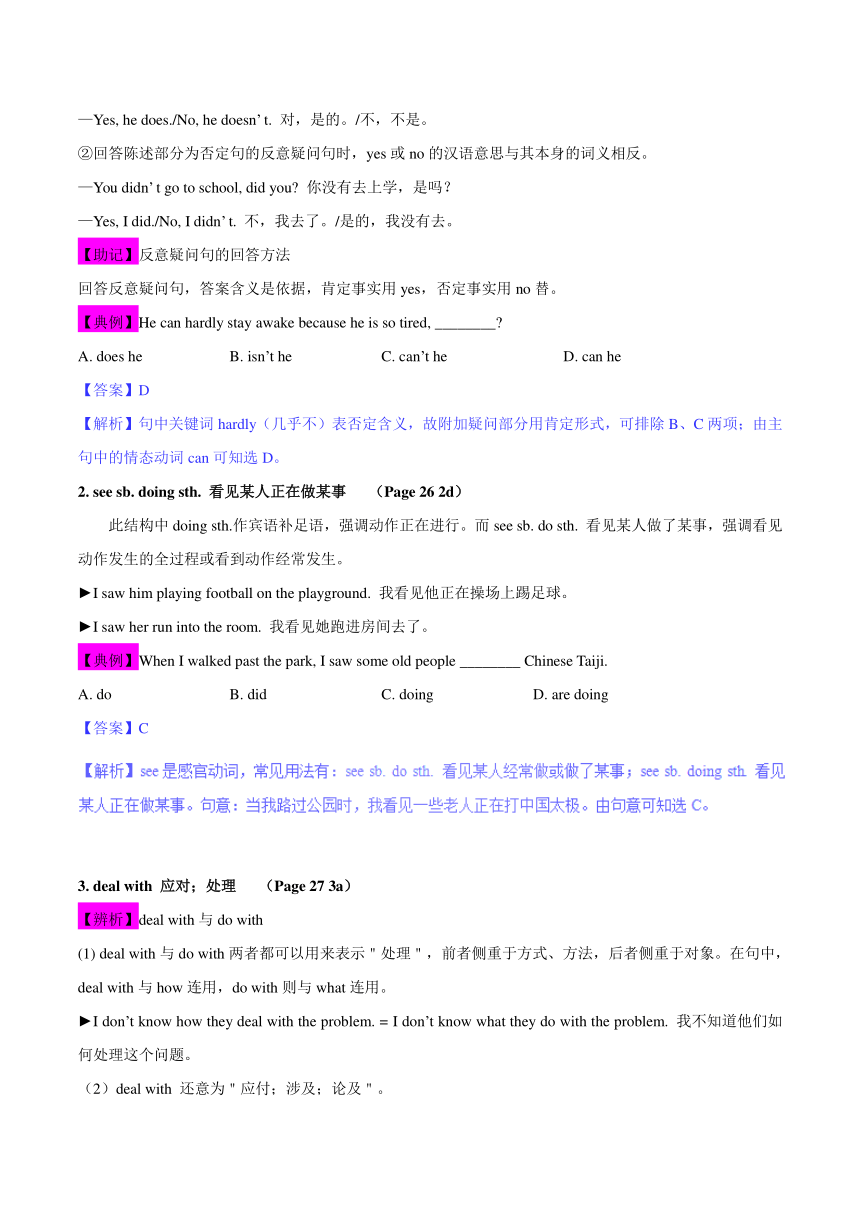
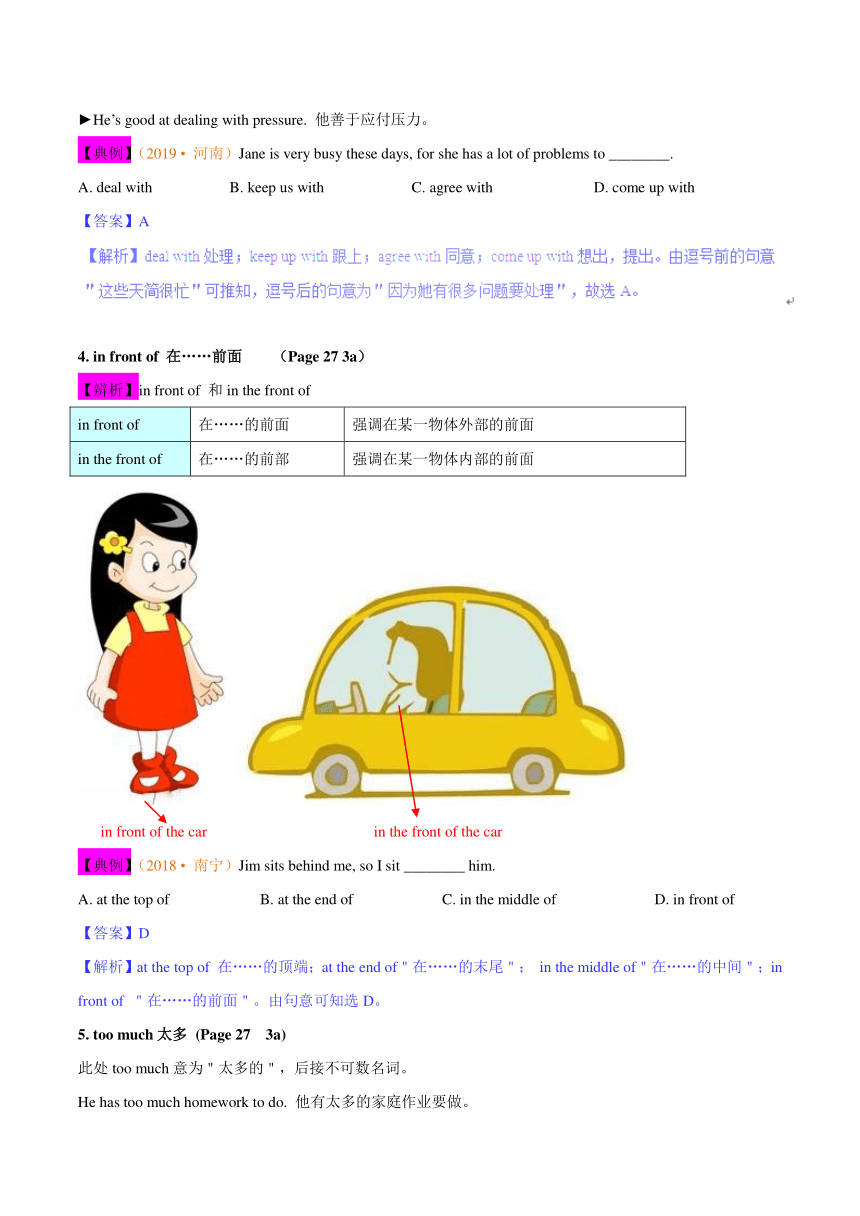
文档简介
知识
课标单词
1. _____________ adj. 有幽默感的;滑稽有趣的
2. silent adj. _____________
3. _____________ adj. 有用的;有帮助的
4. _____________ adj. 亚洲的;亚洲人的 n. 亚洲人
5. dare v. _____________
6. _____________ n. 吨 pl. 大量;许多
7. private adj. _____________
8. _____________ v. 需要;要求
9. speech n. _____________
10. _____________ n. 民众 adj. 公开的;公众的
11. seldom adv. _____________
12. _____________ v. & n. 影响
13. absent adj. _____________
14. _____________ v. 失败;未能(做到)
15. examination n. _____________
16. _____________ adv. 确切地;精确地
17. general adj. _____________ n. _____________
18. _____________ n. 介绍
19. interview v. _____________ n. _____________
目标短语
1. used _____________ 过去常常
2. from _____________ to time 时常;有时
3. deal _____________ 对付;应付
4. be proud _____________ 为……骄傲;感到自豪
5. _____________ person 亲身;亲自
6. take pride _____________ 为……感到自豪
常考句型
1. I used to be _____________ of the dark. 我过去常常怕黑。
2. It is hard to believe that he used to have _____________ in school. 很难相信他过去在学校有许多困难。
3. It’s very _____________ for parents to be there for their children. 父母陪伴在他们的孩子们身边是很重要的。
重点语法
used to的用法
【答案】
课标单词:
1. humorous 2. 不说话的;沉默的 3. helpful
4. Asian 5. 敢于;胆敢 6. ton
7. 私人的;私密的 8. require 9. 讲话;发言
10. public 11. 不常;很少 12. influence
13. 缺席;不在 14. fail 15. 考试;审查
16. exactly 17. adj. 普遍的;常规的;总的 n. 将军
18. introduction 19. v. 采访;面试 n. 面试;访谈
目标短语:
1. to 2. time 3. with
4. of 5. in 6. in
常考句型:
1. afraid 2. difficulties 3. important
重点
1. Mario, you used to be short, didn’t you? 马里奥,你过去很矮,是吗?(Page 25 1a)
(1)used to意为"过去常常",后接动词原形,表示过去经常发生的动作或存在的状态(暗含现在已经不复存在)。
?He used to play basketball at school. 他过去常常在学校里打篮球。
?He used to walk to school. 他过去常常步行去上学。
【辨析】used to do sth., be used to do sth.与be used to doing sth.
used to do sth.
过去常常做某事,只用于过去时态
He used to go to sleep at 9 o’ clock in the evening. 他过去常常在晚上9点钟睡觉。
be used to do sth.
被用于做某事,是被动语态,不定式表目的,可用于多种时态
Wood is used to make houses. 木材被用来造房子。
be used to doing sth.
习惯于做某事,可用于现在、过去、将来等多种时态
He is used to going to sleep early.他习惯于早睡。
【典例】Li Ming used _____________ on the right in China, but he soon got used _____________ on the left in England.
A. to drive; to drive B. driving; driving C. to driving; to drive D. to drive; to driving
【答案】D
(2) 本句是一个反意疑问句,反意疑问句的特点是"前肯后否"或"前否后肯"。
?You are a student, aren’t you? 你是个学生,对吗?
?We can’t take books out, can we? 我们不能把书拿出去,对吗?
【助记】
【拓展】反意疑问句的用法
①回答反意疑问句和回答一般疑问句一样,如果答语是肯定的,用"Yes + 肯定结构";如果答语是否定的,则用"No + 否定结构"。
?—He enjoys singing, doesn’ t he? 他喜欢唱歌,是吗?
—Yes, he does./No, he doesn’ t. 对,是的。/不,不是。
②回答陈述部分为否定句的反意疑问句时,yes或no的汉语意思与其本身的词义相反。
—You didn’ t go to school, did you? 你没有去上学,是吗?
—Yes, I did./No, I didn’ t. 不,我去了。/是的,我没有去。
【助记】反意疑问句的回答方法
回答反意疑问句,答案含义是依据,肯定事实用yes,否定事实用no替。
【典例】He can hardly stay awake because he is so tired, ________?
A. does he B. isn’t he C. can’t he D. can he
【答案】D
【解析】句中关键词hardly(几乎不)表否定含义,故附加疑问部分用肯定形式,可排除B、C两项;由主句中的情态动词can可知选D。
2. see sb. doing sth. 看见某人正在做某事 (Page 26 2d)
此结构中doing sth.作宾语补足语,强调动作正在进行。而see sb. do sth. 看见某人做了某事,强调看见动作发生的全过程或看到动作经常发生。
?I saw him playing football on the playground. 我看见他正在操场上踢足球。
?I saw her run into the room. 我看见她跑进房间去了。
【典例】When I walked past the park, I saw some old people ________ Chinese Taiji.
A. do B. did C. doing D. are doing
【答案】C
3. deal with 应对;处理 (Page 27 3a)
【辨析】deal with与do with
(1) deal with与do with两者都可以用来表示"处理",前者侧重于方式、方法,后者侧重于对象。在句中,deal with与how连用,do with则与what连用。
?I don’t know how they deal with the problem. = I don’t know what they do with the problem. 我不知道他们如何处理这个问题。
(2)deal with 还意为"应付;涉及;论及"。
?He’s good at dealing with pressure. 他善于应付压力。
【典例】(2019 ? 河南)Jane is very busy these days, for she has a lot of problems to ________.
A. deal with B. keep us with C. agree with D. come up with
【答案】A
4. in front of 在……前面 (Page 27 3a)
【辨析】in front of 和in the front of
in front of
在……的前面
强调在某一物体外部的前面
in the front of
在……的前部
强调在某一物体内部的前面
in front of the car in the front of the car
【典例】(2018 ? 南宁)Jim sits behind me, so I sit ________ him.
A. at the top of B. at the end of C. in the middle of D. in front of
【答案】D
【解析】at the top of 在……的顶端;at the end of"在……的末尾"; in the middle of"在……的中间";in front of "在……的前面"。由句意可知选D。
5. too much太多 (Page 27 3a)
此处too much意为"太多的",后接不可数名词。
He has too much homework to do. 他有太多的家庭作业要做。
【辨析】too many, too much与much too
too many
修饰可数名词复数形式,意为"太多的"。
too much
相当于一个形容词,修饰不可数名词,意为"太多的";相当于一个副词,在句中作状语,意为"太多"。
much too
修饰形容词或副词,意为"太,非常"。
?There are too many passengers on the bus.
?There is too much noise in the classroom.
?She talked too much. 她话说得太多。
【助记】too much, much too 与too many的用法区别
too much, much too, 用法区别看后头。
much后跟不可数,too后只跟形或副。
too many要记住,后面名词必复数。
【典例】(2019 ? 贵州黔东南)—He’ s ________ the plan.
—So am I. It costs ________ and we have no enough time.
A. for; too much B. against; too much C.with; much too D. of; much too
【答案】B
6. a very small number of 极少数…… (Page 27 3a)
后接复数名词,在句中作主语时,谓语动词用复数形式。a number of意为"许多;大量"。
【辨析】a number of 与 the number of
a number of
许多……
后接可数名词复数作主语时,谓语动词用复数形式
the number of
……的数量
后接可数名词复数作主语时,谓语动词用单数形式
?A number of apples are red. 许多苹果是红色的。
?The number of students is 2, 000. 学生的数量是2000。
【典例】(2018? 四川眉山)In our school library there ________ a number of books and the number of them ________ growing larger and larger.
A. is; are B. has; is C. are; is D. have; are
【答案】C
【解析】由题干可知,本句为there be句型,它不能与have/has 连用,排除B、D项;a number of + 复数名词意为"许多……",作主语时,谓语动词用复数形式;the number of + 复数名词/代词意为"……的数量",作主语时,谓语动词用单数形式。故选C。
7. What’ s sb. like? 某人长什么样?
?—What’ s your brother like? 你哥哥长什么样子?
—He is tall and a little thin. 他长得高并且有点瘦。
What’ s sb. like?=What does sb. look like?但be like不能与look like同时出现,此时like是介词,无词形变化。
?—What is Tom like? (=What does Tom look like?) 汤姆长什么模样?
—He is very much like his father, tall and dark. 他非常像他的父亲,又高又黑。
【拓展】What is sb. like? 还可用来询问某人的品质。
?—What is Lily like? 莉莉是怎样的一个人?
—She’ s a very nice girl. 她是个非常好的女孩。
【典例】What ________ Mr Wei ________ ?
A. is;like B. does;be like C. is;look like D. is;likes
【答案】A
【解析】考查固定句型。询问某人长相的句型是What’ s sb. like?或What does sb. look like?
8. silent /’ sa?l?nt/ adj. 不说话的;沉默的
?My brother used to be silent. 我哥哥过去不爱说话。
silent的相关短语:
keep silent 保持沉默
?Do you know when you should keep silent? 你知道你该什么时候保持沉默吗?
【拓展】silent的名词形式是silence,常用短语in silence沉默地。
?All of us are reading the test papers in silence. 我们大家正在默默地阅读试卷。
【典例】We felt strange about his ________ (silent) at the party as he used to be very outgoing.
9. helpful /’ helpfl/ adj. 有用的;有帮助的
?Leo and Nick are helpful. Each of us likes them. 莱奥和尼克乐于助人,我们大家都喜欢他们。
helpful的相关短语:
be helpful to sb. 对某人有帮助
?This book is helpful to us. 这本书对我们有帮助。
【拓展】helpful是在help后加形容词后缀-ful构成的形容词。类似的词还有:
thank(v. 感谢)—thankful (adj. 感谢的)
care(n. 小心)—careful (adj. 小心的)
【典例】It’ s very ________ (有帮助的) to discuss your problems with your parents.
【答案】helpful
10. such /s?t?/ adj.如此的;这样的
such用作形容词,修饰名词。主要用法有:
such+a(an)+adj.+单数可数名词+that从句。
?He got such a bad cold that he coughed day and night. 他得了如此重的感冒以至于整日整夜咳嗽。
(2)such+adj.+不可数名词+that从句。
?She has made such great progress that many people like her. 她取得如此大的进步,许多人都喜欢她。
(3)such+adj.+名词复数+that从句。
?They are such interesting books that we all like them. 它们是如此有趣的书,我们都喜欢它们。
【辨析】such与so
用法
含义
例句
such
修饰名词
如此的;这样的
He is such a kind man.=He is so kind a man. 他是如此和蔼的一个男人。
so
修饰形容词或副词
如此;这样
11. It’ s been (is) + 一段时间+since... 自……以来有一段时间了。
此结构中主句动词是has been或is,since引导的从句常用一般过去时。
?It has been (is) two years since his father died. (=His father has been dead for two years. =His father died two years ago.)他父亲去世两年了。
【注意】除此结构外,since引导的时间状语从句通常用一般过去时,其主句常用现在完成时。且也可和此结构相互转换。
?Miss Brown has lived there for three years since she moved there.(=It has been three years since Miss Brown moved there.) 自从布朗小姐搬到那里,她已住在那里三年了。
【典例】It’s been twenty-two years since I ________(work) here.
【答案】worked
12. interview /'?nt?(r)vju?/ v. 采访;面试 n. 面试;访谈
interview作动词时,后接某人作宾语,表示"采访某人,面试某人",短语interview sb. about sth.表示
"采访某人关于某事";作名词时,构成短语have an interview with sb.表示"采访某人"。
?Peter interviewed Mr White yesterday. 彼得昨天采访了怀特先生。
?We will interview the great man about his life tomorrow. 明天我们将采访这个杰出的人,了解他的生活。
?The reporter had an interview with the winner of the competition. 那位记者对这次竞赛的获胜者进行了采访。
interviewer n. 面试者;采访者
interviewee n. 被访问者;被采访者
13. 19-year-old 十九岁的
?He is a 19-year-old young man. 他是一个十九岁的年轻男人。
19-year-old为复合形容词,由"数词+名词(单数)+形容词"构成,而且三者之间要用"-"来连接。用作定语。
【典例】The winner of the singing competition was a ________ girl named Zhang Mei from China.
A. 19-years-old B. 19-year-old C. 19-year-olds
【答案】B
【解析】构成复合形容词的各单词间用连字符"-"连接,而且名词用单数。
14. take up 开始从事
take up此处意为"开始从事",后接名词或动名词作宾语。
?They have taken up golf. 他们开始学起打高尔夫球了。
?Jack took up running for exercise to lose weight this month. 杰克这个月开始通过跑步锻炼来减肥。
【拓展】take up还可意为"占,占地方"。
?Learning English takes up a lot of my time. 学英语占据了我许多时间。
?That big table takes up too much room. 那张大桌子占的地方太大了。
【典例】Bob is taking the desks away because they ________ too much room.
A. stand up B. pick up
C. take up D. listen up
【答案】C
15. require /r?’ kwa??(r)/ v. 需要;要求
?These pets require a lot of care and attention. 这些宠物需要悉心照顾。
require通常不用于进行时;require常用在"require+宾语+动词不定式"结构中。
?They required me to keep silent. 他们要求我保持沉默。
【典例】It’s well-known that learning English well ________time and efforts.
A. requires B. wastes C. takes
基础训练
Ⅰ. 用单词的适当形式填空。
1. It depends on ________(person)taste.
2. The woman couldn’t say a word because of ________ (sad).
3. Tom’s father was very angry about his ________ (care).
4. What a terrible ________ (decide) he made! He shouldn’t refuse the invitation.
5. It is a good idea ________ (take) my dog out for a walk.
6. Please pay attention to ________(take)care of this baby.
Ⅱ. 单项选择。
1. I don’t believe that this ________ boy can paint such a nice picture.
A. five years old B. five-years-old C. five-year-old D. five year old
2. Indeed he has a serious face, but he is very ________ at heart.
A. selfish B. patient C. humorous D. generous
3. —Why are you standing there, Mingming?
—Two tall boys are sitting ________ me, so I can’ t see the blackboard clearly.
A. behind B. next to C. in front of D. beside
4. Sally used to be ________, but now she enjoys meeting and talking to new friends.
A. active B. shy C. honest D. outgoing
5. The number of books in the bookshop is about 10, 000 and a number of them ________ about science.
A. is B. was C. are D. were
6. Don’ t ________ your hope and try again.
A. give up B. look up C. wake up D. make up
7. There is not ________ room for these books, so you’d better put them on the shelf.
A. so much B. much too C. so many D. too many
8. —________?
—He is tall.
A. How is he B. What does he look like C. What does he like
9. —Hi, Sam.Your mother’s busy these days, ________?
—Yes, she is.
A. has she B. is she C. hasn’t she D. isn’t she
III. 句型转换。
1. What’s his father like? (改为同义句)
What ________ his father ________ ________?
2. It’s a nice day, ________ ________? (完成反意疑问句)
3. Liu Tao still plays computer games sometimes. (改为同义句)
Liu Tao still plays computer games ________ ________ _______ ________.
4. Wei Lingxiao is a college student. He is eighteen years old. (合并为一句)
Wei Lingxiao is ________ ________________ college student.
5. Zhu Di dared to dance in public. (改为否定句)
Zhu Di ________ ________ to dance in public.
6. Can you tell me what to do with this problem? (改为同义句)
Can you tell me ________ ________ ________ ________ this problem?
7. She used to take a walk after dinner. (对画线部分提问)
________ ________ she ________ ________ do?
8. She used to live in Jinan. (完成反意疑问句)
She used to live in Jinan, ________ ________?
9. She used to stay up late to watch soccer games. (改为一般疑问句)
________ she ________ ________ stay up late to watch soccer games?
10. I have been trying to ask my father to stop smoking. (改为同义句)
I have been trying to ask my father to ________ ________ smoking.
IV. 从方框中选择合适的单词并用其适当形式完成句子。
(一)
speech, British, silent, humorous, guard, private, Europe, Africa, interview, background
1. —Do you teach ________ English or American English?
—American English.
2. I am a teacher. I have much ________time.
3. Mr. Shi used to be ________. But now he usually talks a lot.
4. Our head teacher made a ________ at the meeting before the winter holiday came.
5. A reporter __________ Mr. President, and they’re talking about the education problems.
6. I have never been to several ________ countries, such as England and France.
7. We should get more information about the ________ of the boy’s family.
8. Egypt(埃及) is an old ________country. It has many ancient buildings like the pyramids(金字塔).
9. Two ________ are sitting at each side of the school gate now.
10. He is very ________. We all like to talk with him.
(二)
give a speech, be afraid of, keep silent, from time to time, in public
11. His brother is very shy so he hardly shows up ________.
12. The pianist is very old, but he still plays it ________.
13. Being punished by the teacher, the little boy ________ and didn’t say a word for about an hour.
14. The Chief Executive of Hong Kong ____________ to call on people to stay calm and unite together.
15. Don’t ____________ failure. Nobody will succeed until he tries hard.
V. 根据汉语提示完成句子。
1. 如果你不知道事实,请保持沉默。
If you don’ t know the truth, please keep________.
2. 令人吃惊的是,我们的新操场占了学校一半多的面积。
It’ s amazing that our new playground________ ________more than half of the school area.
3. —How did you ________ ________ (对付) that naughty boy?
—By talking to him.
4. There were ________ ________ ________ ________ (一小部分) students on the playground.
________ ________ ________(……的数目) them was forty-five.
5. Be quiet!Our manager is ________(面试) a ________ (十六岁的) girl in the meeting room.
6. Many students are waiting for the job __________(面试).
7. The teacher ________(要求) us to clean the classroom after class every day.
8. There are two ________(警卫) in our school every day.
9. A science teacher gave a ________(讲话) for us last Friday.
10. The little girl doesn’ t ________ (敢) to go out by herself.
VI. 根据句意及首字母提示完成单词。
1. There is an A________ map on the wall. We can find China on it.
2. Tom s________ two goals before half-time(中场休息时间).
3. Yesterday my father took a picture of me with the sea in the b________.
4. Mary was born in England. So she speaks B________ English.
5. It is impolite to read other people’s p________ letters.
VII. 选词填空。
1. I saw a cat ________ (climbing/to climb) the tree to catch a bird.
2. Gina will take up __________ (play/playing) the piano next year.
3. Lily required us ________ (help/to help) her after school.
4. She used to ________ (walk/walking) to school.
5. I have already ________ (deal/dealt) with the problem.
能力提升
I. 完形填空。
I used to have little passion(激情) in my life. But what happened the other day changed my mind. It was then that I learned how 1 it is to have a passion in life.
That day I went home in Mom’s car. When Mom 2 at a red light, someone on the side of the road caught my eye. It was a man dressed 3 rags(破旧衣服). He was homeless. That didn’t interest me, because I had seen 4 like him before. Those people usually looked unhappy and hopeless.
But this man was 5 in some way. He was not sitting down with a 6 expression. Instead, he had a 7 in his hand and was dancing happily to the music. The radio seemed to be the most precious(珍贵的) thing he had. "Mom, why does that man have a radio 8 he’ s homeless?" I asked.
"He 9 it," she replied.
"But why doesn’ t he use the money to buy food or clothes? He 10 something that he didn’ t need."
"Well, Sarah, sometimes food and clothes aren’t the most important."
That man must care so much about 11 that he bought a radio instead of food or clothes. I soon realized that 12 is the key to life.
Since then I am always thinking of 13 is truly important in life. A home, a meal, clothes—these things are 14 part of the life. What we often forget is that we all need a joy, a light in a 15 day. We all need a passion which gives a person the happiness they need to keep going.
1. A. strange B. important C. dangerous D. difficult
2. A. stopped B. walked C. stood D. exercised
3. A. in B. on C. at D. of
4. A. none B. few C. all D. many
5. A. common B. different C. polite D. rude
6. A. sad B. nervous C. mad D. happy
7. A. hat B. phone C. scarf D. radio
8. A. though B. because C. until D. unless
9. A. borrowed B. made C. fixed D. bought
10. A. asked for B. waited for C. paid for D. looked for
11. A. stories B. music C. news D. languages
12. A. knowledge B. health C. happiness D. friendship
13. A. who B. what C. where D. when
14. A. only B. all C. also D. never
15. A. warm B. hot C. dark D. relaxing
II. 阅读理解。
A
I used to be selfish(自私的), I should say. But one moment changed me.
I was on my lunch break and had left the school to get something to eat .On the way, I saw a man playing the guitar, with a hat in front of him. I had some coins in my pocket, but I would not give them to him, thinking to myself he would use the money to buy drugs or alcohol(毒品或酒). He looked like that type of man, young and ragged. But I then realized I had no right to place myself above him just because he was praying for money.
I stopped and dropped all the coins into his hat, and he smiled at me, I watched for a while. Selfish as it sounds, I expected something more to come from that moment—like a feeling of happiness or so. But nothing happened, I walked off. "It seemed to be a waste of money ,"I thought.
On my way home at the end of the day, I saw the man again and he was packing up .I watched him pick up the hat and walk to a store. There he poured the all the money into a box, which was used to collect money for the people after an earthquake(地震). He was praying for charity(慈善)!
Now I give any coin I have to charity boxes and enjoy the feeling of giving.
1. What did the writer use to be like?
A. Kind. B. Selfish. C. Clever. D. Friendly.
2. When did the writer see a man playing for money?
A. In the morning. B. At noon. C. In the afternoon. D. At night.
3. What does the underlined word "ragged" mean in this passage?
A. 精力充沛的 B. 乐于助人的 C. 骄傲自大的 D. 衣衫褴褛的
4. Which of the following is NOT true?
A. The writer didn’t want to give the money to the man at first.
B. The writer felt very happy after giving the money to the man.
C. The writer saw the man twice that day.
D. The man gave all the money he had to the charity.
5. We can learn from the passage that now the writer __________.
A. is a friend of the young man B. enjoys helping others
C. is saving money for the poor D. enjoys collecting coins
B
I used to have a friend called Matilda. We were together at secondary school. When we were 16, she moved because of her father’s job, but we kept in touch. We used to write long letters to each other. I went to stay with her a couple of times too. We lost contact(联系) after university. I’d love to see her again because we used to be really good friends.
I used to hate a couple of teachers at school, but I think the one I hated the most was my French teacher. He was really terrible. I don’t think he liked children or even teaching. He used to be impatient with us and he didn’t explain things well. I failed French — it was the only subject I ever failed at school.
I used to play a lot of squash(壁球), but I recently started playing tennis and now I like it better. The problem with squash is that it’s pretty hard and maybe I’ m just not strong enough to play it. Also the friend I used to play with always beat me. The great thing about tennis is that it’s outdoors so I can enjoy the fresh air. It’s less competitive and more fun. The only problem is that you can’t play when it rains.
6. What does the underlined phrase "kept in touch" mean in Chinese?
A. 失去联系 B. 保持联系 C. 总是争吵 D. 从不争吵
7. When did the writer and her friend Matilda lose contact?
A. At secondary school. B. During high school. C. During college. D. After university.
8. The writer’ s French teacher was __________.
A. very strict with his students B. good at playing tennis
C. bad at teaching D. very humorous
9. In the writer’s opinion, squash is __________.
A. relaxing B. interesting C. easy to learn D. hard to play well
10. According to the passage, the writer __________.
A. hated learning French B. has more friends than before
C. thinks tennis is more fun than squash D. has never lost a game in playing tennis
III. 任务型阅读。
I’m Li Rui. I used to be thin, but I’m heavy now. I think I should eat less and exercise more. I used to have short black hair. Now it grows long. It’s curly and brown. I used to be wild. Now I’ m more serious than before. I used to keep a pet dog. Now I don’t have any pets. Because I’m too busy to look after them.
My name’s Liu Na. I used to be tall and heavy, but I’ m thin now. My hair used to be long and straight. It looked very nice, just like a waterfall(瀑布). Now it’s short and curly. I think I am smart now. I don’t keep pets. I don’t like them, either. I think some of them are dirty and noisy(吵闹的). And I have to spend time on them.
阅读短文,完成文后表格
Name
Appearance(外貌)
Personality(个性)
Pet
Li Rui
used to:1. _______ now:2. _______
used to:3. _______ now:4. _______
used to:
5. _______
Liu Na
used to:6. _______ now:7. _______
now:8. _______
真题练习
1.(2018 ? 湖北宜昌中考)—When are we going to see the movie ZooTopia, this afternoon or tonight?
— is OK. I’ m free today.
A. Either B. Neither C. Both D. All
2.(2019 ? 湖北襄阳中考)—I can’t stand swimming in cold rivers in winter.
—But it’s for your health. You know I often swim in rivers in different seasons.
A. helpful B. harmful C. painful D. careful
3.(2019 ? 江苏连云港中考)—Yan Jiashuo, a girl, has won the prize of International Master of Memory.
—Wow, she’s great, isn’t she?
A. ten-year-old B. ten-years-old C. ten year old D. ten years old
4. (2018 ? 广东深圳市中考)—I had a quarrel with my friend Jim yesterday, and now I it.
—Why not go and say sorry to him at once? It’s never too late to mend.
A. feel ashamed of B. am proud of C. am interested in
5. (2018? 湖北武汉中考)Are you alone? I just want a word with you.
A. single B. new C. private D. certain
6. (2018年江苏省无锡市中考)—Do you watch Peppa Pig on TV? It’s so funny!
—Well, no, to be , I think it’s quite silly.
A. curious B. brave C. gentle D. honest
7. (2018年上海中考)Old Mr. Green doesn’t feel because some students visit him regularly.
A. sadly B. gently C. lonely D. angrily
8. (云南省2019 年中考)Don’t play games on the computer all day. It’s to your eyes.
A. harmful B. useful C. helpful D. thankful
参考答案
基础训练
Ⅰ. 用单词的适当形式填空。
1. personal 2. sadness 3. carelessness
4. decision 5. to take 6. taking
Ⅱ. 单项选择。
1. C 【解析】考查five-year-old作前置定语的用法。five-year-old这类复合词可以用作形容词,意为"五岁的",表示计量的名词总是用单数形式。这类结构通常用作前置定语,不用作表语(作表语时可改用five years old这样的形式)。
3. C【解析】由I can’ t see the blackboard clearly"我看不清黑板"可推知明明站在那儿的原因是他"前面"坐着两个高个子男孩,故答案选C,意为"在……的前面"。
4. B【解析】考查形容词辨析。active"积极的";shy"害羞的";honest"正直的";outgoing"外向的"。由后半句句意"但是现在她喜欢结识新朋友并且喜欢和他们交谈"可知,前半句意思应为"萨莉过去很害羞"。故选B。
5. C 【解析】考查主谓一致的用法。依据前半句中的谓语动词"is(一般现在时)"可推断出后半句的时态也应是一般现在时,故排除B、D两项;短语"a number of…"后的谓语动词用复数形式,故选C。
6. A【解析】句意:不要放弃你的希望,再试一次。give up放弃;look up在(字典,书等中)查找;wake up醒来;make up编造。结合句意可知选A。
7. A 【解析】本题意为"没有那么多的地方来放这些书,因此你最好将它们放在书架上"。room在此处意为"空间",是不可数名词,应该用much来修饰,由此可排除C、D两项;much too用来修饰形容词或副词,故排除B项。选A。
8. B【解析】析How is he?"他身体怎么样?";What does he look like?"他长相如何?";What does he like?"他喜欢什么?"。根据答语"他个子很高"可知是描述长相,故选B。
9. D【解析】由these days和答语中的she is可知,这里是一般现在时,故mother’ s是mother is的缩略形式,再根据"前肯后否"的原则可知这里应该用isn’ t she。
III. 句型转换。
1. does;look like 2. isn’ t it 3. from time to time
4. an eighteen-year-old 5. didn’ t dare 6. how to deal with
7. What did; use to 8. didn’ t she 9. Did; use to
10. give up
IV. 从方框中选择合适的单词并用其适当形式完成句子。
1. British 2. private 3. silent 4. speech 5. is interviewing
6. European 7. background 8. African 9. guards 10. humorous
11. in public 12. from time to time 13. kept silent 14. gave a speech 15. be afraid of
V. 根据汉语提示完成句子。
1. silent 2. takes up 3. deal with
4. a small number of;The number of 5. interviewing;16-year-old
6. interview 7. requires 8. guards
9. speech 10.dare
VI. 根据句意及首字母提示完成单词。
1. Asian 2. scored 3. background 4. British 5. private
VII. 选词填空。
能力提升
I. 完形填空。
【文章大意】本篇文章难度适中,主要讲述我过去对生活没有热情,但由于我受到一个无家可归的人的影响,我对生活充满了热情。
1. B【解析】句意"后来我学到了在生活中热情是多么的重要"。A.奇怪的;B.重要的;C.危险的;D.困难的。根据句意,故选B。
2. A【解析】句意"那天我坐妈妈的车回家,当妈妈停车等绿灯时,道路一旁的人引起了我的注意力"。A.停止;B.走起;C.站;D.锻炼。根据句意,故选A。
3. A【解析】句意"一个穿着破旧衣服的人"。"in+衣服"指穿……的衣服。故选A。
4. D【解析】句意"我对那个不感兴趣,因为我以前看到过许多"。A.没有;B.几乎没有;C.所有的;D.许多,后加可数名词的复数。根据句意,故选D。
5. B【解析】句意"但是,他在某些方面有些不同,他没有悲伤地坐在那里,取而代之的是,他手里拿着收音机,高兴地跳舞"。A.相同的;B.不同的;C.礼貌的;D.粗鲁的。根据Instead, he had a ____7____ in his hand and was dancing happily to the music可知,他和其他无家可归的人不同,故选B。
6. A【解析】句意"但是,他在某些方面有些不同,他没有悲伤地坐在那里,取而代之的是,他手里拿着收音机,高兴地跳舞"。A.悲伤的;B.紧张的;C.疯狂的;D.高兴的。根据Instead, he had a ____7____ in his hand and was dancing happily to the music可知,happy对应的是悲伤sad,故选A。
7. D【解析】句意"但是,他在某些方面有些不同,他没有悲伤地坐在那里,取而代之的是,他手里拿着收音机,高兴地跳舞"。A.帽子;B.电话;C.围巾;D.收音机。根据下文The radio seemed to be the most precious (珍贵的) thing he had可知,故选D。
8. A【解析】句意"妈妈,为什么他无家可归,但是他还有收音机?"。A.尽管;B.因为;C.直到;D.除非。根据句意,故选A。
11. B【解析】句意"那个男的一定很在意音乐,他买了收音机而不是食物和衣服"。A.故事;B.音乐;C.新闻;D.语言。根据Instead, he had a ... in his hand and was dancing happily to the music可知,故选B。
12. C【解析】句意"不久,我意识到开心是生活的关键"。A.知识;B.健康;C.高兴;D.友谊。根据上文可知,一个无家可归的人虽然生活悲惨,但是过得很愉快,所以我从这个人身上学到了"开心是生活的关键",故选C。
13. B【解析】句意"从那时起,我总是在想生活中真正重要的是什么"。A.谁;B.什么;C.哪里;D.什么时候。根据句意,故选B。
14. A【解析】句意"家、食物、衣服——这些事仅仅是生活中的一部分"。A.仅仅;B.所有;C.也;D从不。根据上文可知,一个无家可归的人虽然生活悲惨,但是他没有用钱买食物和衣服,而是买了一个收音机,并愉快的跟着收音机跳舞,所以,家、食物、衣服——这些事仅仅是生活中的一部分,所以选A。
15. C【解析】句意"我们经常忘记的是,我们需要快乐,黑暗中需要光"。A.温暖;B.热;C.黑暗;D.放松的。根据句意,故选C。
II. 阅读理解。
A
【文章大意】本文讲述了一次作者看见一个街头艺人,思考再三后决定将零钱捐给了他,后来发现这个艺人筹集这些钱是为了捐给地震灾区,他是为了慈善而卖艺的,从此以后作者从原来很自私开始改变了。
1. B【解析】细节理解题。根据文章第一句I used to be selfish, I should say.可知作者过去是"很自私的",结合选项,故答案选B。
2. B【解析】细节理解题。根据文中的句子I was on my lunch break and had left the school to get something to eat. On the way, I saw a man playing the guitar,可知作者是在午休离开学校去吃东西是看到一个人在演奏,结合选项,故答案选B。
4. B【解析】理解归纳题。题意:下列哪一个句子是不正确的?A. The writer didn’ t want to give the money to the man at first.作者起初并不想把钱给那个人。B. The writer felt very happy after giving the money to the man.作者把钱给了那个人,感到很高兴。C. The writer saw the man twice that day.作者那天看到那个人两次。D. The man gave all the money he had to the charity.这个人把所有的钱都给了慈善机构。通过对全文的理解,结合选项,可知答案选B。
5. B【解析】主旨归纳题。根据Now I give any coin I have to charity boxes and enjoy the feeling of giving.现在我把所有的硬币都捐给慈善机构,并享受给予的感觉。可知作者现在也喜欢帮助别人。结合选项,故答案选B。
B
【文章大意】短文讲述了作者上学的一些情况。作者有个好朋友16岁时搬往别处,先是一直保持联系,但大学后失去联系,现在很想念她。作者还很憎恶法语老师,因为他不喜欢孩子,不会教学。最后讲到不再喜欢壁球而喜欢网球,因为是在户外,可以享受新鲜空气。
6. B【解析】题意:划线短语"kept in touch"在汉语中是什么意思?考查理解词义题。根据下文的叙述We used to write long letters to each other. I went to stay with her a couple of times too. We lost contact after university.,可知他们在大学毕业前一直保持联系。故选B。
7. D【解析】题意:作者是什么时候和她的朋友失去联系的?考查细节理解题。A. At secondary school. 在中学;B. During high school.在高中;C. During college.在大学;D. After university.大学后。根据句子We lost contact after university.,可知他们在大学毕业后就失去了联系。故选D。
8. C【解析】题意:作者的法语老师______。考查细节理解题。A. very strict with his students对学生要求严格;B. good at playing tennis擅长打棒球;C. bad at teaching教学不好;D. very humorous非常幽默。根据下文内容,结合句子He used to be impatient with us and he didn’ t explain things well.,可知法语老师不怎么懂得教学。故选C。
9. D【解析】题意:在作者看来,壁球是______。考查细节理解题。A. relaxing令人放松的;B. interesting有趣的;C. easy to learn很容易学的;D. hard to play well很难打好的。根据下文内容The problem with squash is that it’ s pretty hard and maybe I’ m just not strong enough to play it.,可知墙壁很难打好。故选D。
III. 任务型阅读。
1. thin/short black hair 2. heavy/long curly brown hair
3. wild 4. more serious 5. a pet dog
6. tall and heavy/long straight hair 7. thin/short curly hair 8. Smart
真题练习
1. A【解析】句意:——我们什么时候去看电影《疯狂动物城》,今天下午还是今天晚上?——什么时候都行,我今天有空。Either两者之一;Neither两者都不;Both两者都;All三者或以上都。这个问题中给了两个选择的时间,根据I’ m free today可知,这两个时间哪一个都可以,故选A。
2. A【解析】句意:——我不能忍受冬天在寒冷的河里游泳。——但这对你的健康有帮助。你知道我经常在不同季节的河里游泳。helpful有帮助的;harmful有害的;painful痛苦的;careful小心的,仔细的。结合生活常识,所以选A。
3. A【解析】句意:——闫佳硕是一个10岁的女孩,已经获得了国际大师的奖励。——哇,她真伟大,是吗?这里空格处缺少定语,故用复合形容词作定语,数词—名词(单数)—形容词,year用单数形式。
4. A【解析】考查动词短语。句意:——我和我的朋友Jim昨天吵了一架,现在我感到非常忏愧。——为什么不马上去向他道歉?现在弥补还来得及。feel ashamed of感到忏愧;am proud of 为……感到自豪;am interested in 对……感兴趣。故选A。
5. C【解析】考查形容词词义辨析。句意:你一个人吗?我只是想和你私下谈谈。single单个的;new新的;private私人的,私下的;certain一定的。根据Are you alone?可知要单独私下和他谈,故选C。
6. D【解析】句意:——你在电视上观看《小猪佩奇》了吗?真有趣!——嗯,不,说实话,我认为它很愚蠢。A. curious好奇的;B. brave勇敢的;C. gentle高尚的;D. honest诚实的。to be honest意思是"说实话",否定对方的观点,提出自己的观点,结合语境可知,答案为D。
8. A【解析】句意:不要整天在电脑上玩游戏,对你的眼睛有害。本题考查形容词。A. harmful有害的;B. useful有用的;C. helpful有帮助的;D. thankful感激的。根据句意可知选A。
同课章节目录
- Unit 1 How can we become good learners.
- Section A
- Section B
- Unit 2 I think that mooncakes are delicious!
- Section A
- Section B
- Unit 3 Could you please tell me where the restroom
- Section A
- Section B
- Unit 4 I used to be afraid of the dark.
- Section A
- Section B
- Unit 5 What are the shirts made of?
- Section A
- Section B
- Review of Units 1-5
- Unit 6 When was it invented?
- Section A
- Section B
- Unit 7 Teenagers should be allowed to choose their
- Section A
- Section B
- Unit 8 It must belong to Carla.
- Section A
- Section B
- Unit 9 I like music that I can dance to.
- Section A
- Section B
- Unit 10 You're supposed to shake hands.
- Section A
- Section B
- Review of Units 6-10
- Unit 11 Sad movies make me cry.
- Section A
- Section B
- Unit 12 Life is full of the unexpected
- Section A
- Section B
- Unit 13 We're trying to save the earth!
- Section A
- Section B
- Unit 14 I remember meeting all of you in Grade 7.
- Section A
- Section B
- Review of Units 11-14
